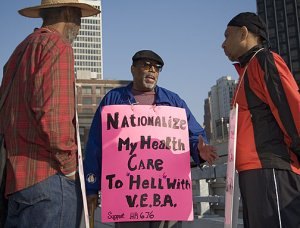Bailout Watch 426: VEBA Equity Deal Could Give UAW 25 Percent Of Ford
Covering Detroit’s massive health care liabilities is perhaps the single greatest challenge facing those working on the auto industry bailout, reports the Washington Post. Detroit retirees in particular represent a huge commitment, as current health care benefits include dental, vision and prescription drug benefits for the low price of $11 per month. And as the automakers burn through their cash, they must come up with some way of maintaining or cutting benefits in the face of rising health care costs. GM currently carries $20B in health care obligations, over ten times its market capitalization. Chrysler owes $10B and Ford owes $3.2B of its total $13.2B VEBA commitment this year alone. With bailout plans calling for automakers to inject equity rather than tight cash into the VEBA system, a number of unintended consequences are being forecast.
In GM’s case, the biggest challenge is avoiding stock price degradation. At ten times its current market cap, GM must not only reduce the amount of equity it is being asked to put into VEBA, it must also convince investors that the VEBA deal will leave GM stronger than it was. Otherwise, GM’s already threatened stock could become a target for sell-offs. Especially considering it has over $30B in unsecured debt that it must also convert into equity. Needless to say these kinds of radical equity restructurings are rarely attempted, let alone completed, outside of bankruptcy court.
In the case of Ford, thedetroitbureau.com reports that the $1.6B that Dearborn must fork over in equity is equal to 25 percent of the company’s stock. This would make the VEBA board a major stockholder in Ford, a possibility that wories many. Five of the VEBA board’s 11 members are UAW members, and the other six are subject to union review. According to Steve Diamond, a professor of law at Santa Clara University [Ed. Go Broncos!] in California, the VEBA board is an opaque institution with a record of incomplete disclosure. Moreover, says Diamond, the union shouldn’t be allowed to negotiate the terms of VEBA. VEBA trustees “are the only ones that should have a say over the cash flow into the fund,” he argues.
In short, the Detroit automakers still owe more in union health care obligations alone than they are worth on the open market. And even with plans to put equity into VEBA instead of cash, and with the union accepting a 50 percent payout, this single obligation could bring any of the Detroit firms down. Or place them under union control. Needless to say, only bankruptcy proceedings can unburden the automakers fom this ruinous debt.
More by Edward Niedermeyer
Latest Car Reviews
Read moreLatest Product Reviews
Read moreRecent Comments
- Varezhka Maybe the volume was not big enough to really matter anyways, but losing a “passenger car” for a mostly “light truck” line-up should help Subaru with their CAFE numbers too.
- Varezhka For this category my car of choice would be the CX-50. But between the two cars listed I’d select the RAV4 over CR-V. I’ve always preferred NA over small turbos and for hybrids THS’ longer history shows in its refinement.
- AZFelix I would suggest a variation on the 'fcuk, marry, kill' game using 'track, buy, lease' with three similar automotive selections.
- Formula m For the gas versions I like the Honda CRV. Haven’t driven the hybrids yet.
- SCE to AUX All that lift makes for an easy rollover of your $70k truck.


































Comments
Join the conversation
"GM’s already threatened stock could become a target for sell-offs." Been there, done that, T-shirt. $2/shr. What difference does it make? Ford. The Ford Family owns stock with multiple votes per share. Having 25% of the outstanding public shares which get one vote per share, gives a right to buy coffee for $1.50 at McDonalds.
[...] Source: thetruthaboutcars.com [...]